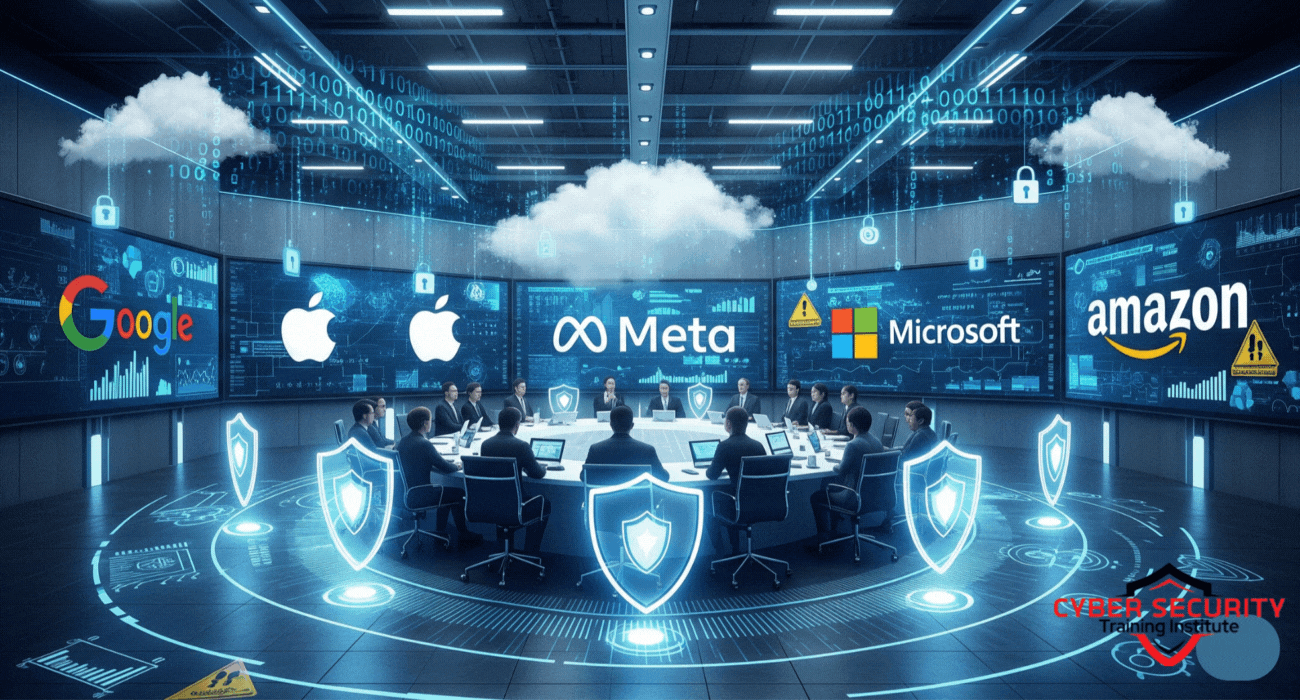Big Tech's Role in Cybersecurity | Are They Doing Enough?
In today’s digital world, where data breaches and cyberattacks seem to make headlines every week, the role of Big Tech companies—think Google, Microsoft, Apple, Amazon, and Meta—has never been more critical. These tech giants shape the tools and platforms billions of people use daily, from cloud storage to social media. But with great power comes great responsibility. Are these companies doing enough to protect users from cyber threats? This blog dives into their efforts, shortcomings, and the broader impact of their cybersecurity practices. Whether you’re a casual internet user or a business owner, understanding Big Tech’s role in cybersecurity can help you navigate the online world more safely.

Table of Contents
- What is Cybersecurity and Why Does It Matter?
- Big Tech’s Role in Cybersecurity
- What Big Tech is Doing Well
- Where Big Tech Falls Short
- Challenges Big Tech Faces
- Comparing Big Tech’s Cybersecurity Efforts
- What More Can Big Tech Do?
- Conclusion
- Frequently Asked Questions
What is Cybersecurity and Why Does It Matter?
Cybersecurity is the practice of protecting internet-connected systems—computers, servers, mobile devices, and data—from unauthorized access, attacks, or damage. Think of it as a digital lock on your online life. It matters because cyberattacks, like hacking, phishing, or ransomware, can lead to stolen personal information, financial loss, or even disrupted critical services like hospitals or power grids.
Big Tech companies are at the heart of this battle. They manage vast amounts of data—your emails, photos, financial details, and more. If their systems are breached, the fallout can affect millions. For example, a 2021 data breach at a major tech company exposed the personal information of over 500 million users. Cybersecurity isn’t just a tech issue; it’s a trust issue.
Big Tech’s Role in Cybersecurity
Big Tech companies aren’t just building apps or selling gadgets; they’re the backbone of the internet. They provide:
- Cloud services (e.g., Amazon Web Services, Microsoft Azure)
- Operating systems (e.g., Apple’s iOS, Google’s Android)
- Social platforms (e.g., Meta’s Facebook and Instagram)
- Search engines and email services (e.g., Google’s Gmail)
Because they control so much of the digital infrastructure, their cybersecurity practices set the standard. They invest billions in security teams, encryption, and threat detection systems. But is it enough? Let’s explore what they’re doing right and where they’re falling short.
What Big Tech is Doing Well
Big Tech has made significant strides in cybersecurity. Here are some of their key efforts:
- Encryption: Companies like Apple and Google use end-to-end encryption for services like iMessage and Gmail, meaning only the sender and receiver can read the messages. Even if hackers intercept the data, it’s unreadable.
- Two-Factor Authentication (2FA): Most Big Tech firms offer 2FA, requiring a second form of verification (like a text message code) to log in, making it harder for hackers to access accounts.
- Bug Bounty Programs: Companies like Microsoft and Meta pay ethical hackers to find and report vulnerabilities in their systems. For example, Google paid out over $10 million in 2022 to researchers who identified security flaws.
- Regular Updates: Apple and Microsoft frequently release software updates to patch security holes, protecting users from new threats.
- AI-Powered Threat Detection: Amazon and Google use artificial intelligence to monitor suspicious activity, like unusual login attempts, in real time.
These efforts show that Big Tech is serious about security. Their resources allow them to hire top talent and deploy cutting-edge technology, setting a high bar for the industry.
Where Big Tech Falls Short
Despite their efforts, Big Tech isn’t perfect. Here are some areas where they struggle:
- Data Collection Practices: Companies like Meta and Google rely on collecting user data for advertising, which creates a treasure trove for hackers. The more data stored, the bigger the target.
- Supply Chain Attacks: Big Tech relies on third-party vendors, which can be weak links. The 2020 SolarWinds hack, which affected Microsoft and others, showed how vulnerabilities in the supply chain can lead to massive breaches.
- Transparency Issues: Some companies are slow to disclose breaches. For instance, a major tech firm took months to notify users of a 2019 breach, eroding trust.
- Privacy vs. Security: Apple’s strong stance on privacy, like refusing to unlock iPhones for law enforcement, can clash with security needs, creating debates about where to draw the line.
- User Education: Big Tech often assumes users understand basic security practices, like avoiding phishing emails, but many don’t. More proactive education could reduce risks.
These gaps highlight that even the biggest players aren’t immune to mistakes or oversights.
Challenges Big Tech Faces
Cybersecurity isn’t easy, even for tech giants. They face several challenges:
- Evolving Threats: Hackers are getting smarter, using advanced techniques like AI-generated phishing emails or deepfake videos to trick users.
- Global Scale: Operating in multiple countries means complying with different regulations, like the EU’s GDPR or China’s cybersecurity laws, which can complicate security efforts.
- User Behavior: No matter how secure a platform is, users who reuse passwords or click suspicious links can undermine those efforts.
- Balancing Usability and Security: Too many security measures, like complex password requirements, can frustrate users and lead them to bypass protections.
These challenges don’t excuse shortcomings but show the complexity of the cybersecurity landscape.
Comparing Big Tech’s Cybersecurity Efforts
Here’s a quick look at how some major players stack up in key cybersecurity areas:
| Company | End-to-End Encryption | Bug Bounty Program | 2FA Availability | Recent Major Breach |
|---|---|---|---|---|
| Yes (Gmail, Drive) | Yes ($10M+ paid in 2022) | Yes | None reported recently | |
| Apple | Yes (iMessage, iCloud) | Yes ($2M max reward) | Yes | None reported recently |
| Microsoft | Partial (Teams, not Outlook) | Yes ($13.7M paid in 2021) | Yes | SolarWinds (2020) |
| Meta | Yes (WhatsApp) | Yes ($1.8M paid in 2022) | Yes | 2019 breach (533M users) |
| Amazon | Yes (AWS services) | Yes (AWS-focused) | Yes | None reported recently |
What More Can Big Tech Do?
To step up their game, Big Tech could focus on:
- Better User Education: Create simple, engaging guides on spotting phishing emails or setting up 2FA.
- Minimize Data Collection: Collect only what’s necessary to reduce the risk of breaches.
- Faster Breach Disclosure: Notify users immediately when a breach occurs to limit damage.
- Collaborate More: Share threat intelligence with other companies and governments to combat cyberattacks faster.
- Invest in Emerging Tech: Explore quantum-resistant encryption to stay ahead of future threats.
By addressing these areas, Big Tech can build greater trust and make the internet safer for everyone.
Conclusion
Big Tech companies are undeniably leaders in cybersecurity, leveraging their vast resources to deploy encryption, AI, and bug bounty programs. However, their massive data collection, occasional lack of transparency, and reliance on third parties create vulnerabilities. While they face complex challenges like evolving threats and global regulations, there’s room for improvement—especially in user education and faster breach responses. Ultimately, Big Tech’s role in cybersecurity is a balancing act between innovation, responsibility, and trust. They’re doing a lot, but there’s still work to be done to keep users safe in an increasingly digital world.
Frequently Asked Questions
What is cybersecurity?
Cybersecurity is the practice of protecting digital systems and data from unauthorized access or attacks.
Why is Big Tech important in cybersecurity?
Big Tech manages critical platforms and data for billions, making their security practices vital to global internet safety.
What is end-to-end encryption?
It’s a security method where only the sender and receiver can read the data, keeping it safe from hackers.
What is two-factor authentication (2FA)?
2FA adds an extra step, like a code sent to your phone, to verify your identity when logging in.
What are bug bounty programs?
Companies pay ethical hackers to find and report security flaws in their systems.
Do all Big Tech companies use encryption?
Most do, but the extent varies. For example, Apple uses it for iMessage, while Microsoft’s Outlook lacks full end-to-end encryption.
What was the SolarWinds hack?
A 2020 cyberattack where hackers used a software update to breach multiple companies, including Microsoft.
Why do data breaches happen?
Breaches occur due to weak security, human errors, or sophisticated attacks exploiting system vulnerabilities.
How does Big Tech use AI in cybersecurity?
AI monitors systems for unusual activity, like suspicious logins, to detect threats in real time.
What is phishing?
Phishing is when hackers send fake emails or texts to trick users into sharing personal information.
Why does Big Tech collect so much data?
Data fuels their services, like targeted ads, but it also makes them targets for hackers.
Can Big Tech prevent all cyberattacks?
No, no system is 100% secure, but they can reduce risks with strong measures.
What is a supply chain attack?
An attack targeting a company’s third-party vendors to gain access to its systems.
How often do Big Tech companies update their software?
Regularly, often monthly or as needed, to patch security vulnerabilities.
Why don’t users get notified about breaches right away?
Some companies delay to assess the damage or due to legal or PR concerns, though this is improving.
What’s the biggest cybersecurity threat today?
Ransomware, where hackers lock systems and demand payment, is a growing concern.
Does Big Tech share data with governments?
Sometimes, under legal orders, but companies like Apple prioritize user privacy and resist when possible.
How can users protect themselves online?
Use strong passwords, enable 2FA, avoid suspicious links, and keep software updated.
What is quantum-resistant encryption?
Encryption designed to withstand attacks from quantum computers, which could break current methods.
Are Big Tech’s efforts enough to keep us safe?
They’re making progress, but gaps in transparency and data practices mean there’s still work to do.
What's Your Reaction?
 Like
0
Like
0
 Dislike
0
Dislike
0
 Love
0
Love
0
 Funny
0
Funny
0
 Angry
0
Angry
0
 Sad
0
Sad
0
 Wow
0
Wow
0
















